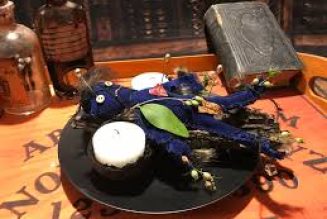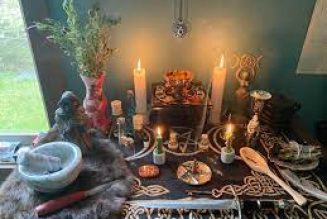
So you’ve been reading up on Paganism, witchcraft, Wicca, and all kinds of other things, and it seems pretty straightforward… but you’re probably wondering How does magic work, anyway?
Well, it’s a really good question, and one that may have a number of different answers, depending on which people you ask. First, there are many different types of magic — natural magic, practical magic, high magic, ceremonial magic — and each is a little bit varied from the others.
Even when it comes to spell work, you’ll find a number of opinions on the Hows and Whys of the process.
In natural magic, there is a theory that many natural objects — rocks, roots, plants, animal bones, etc. — have a connection within them to some part of the human experience. For example, a rose quartz is linked with love and matters of the heart, a piece of oak would take on the attributes of strength and sturdiness, and a sprig of sage is connected to wisdom and purification. In this form of magic, also called sympathetic magic, the link between items and their magical symbolism is referred to as the Doctrine of Signatures. Spellwork in natural magic is often carried out with no prayer or invocation to deities or gods. It is simply the natural attributes of the items involved in the spell that make the magic happen.
Cat Yronwoode at Lucky Mojo explains that “for most folk-magicians, symbology is very important.
Faith, technical knowledge, precognitive intent, and emotional power fuel belief and confidence in the effects of a culturally appropriate symbological working. However, once the rules of each system of magic are internalized by the practitioner, a great deal of improvisation may be done for any given ritual or magical job of work.
The mark of a good magician in his or hr own school of magic is his or her ability — to borrow an analogy from music — to seamlessly improvise a tune within the chord structure of the system being used.”
In some traditions of Wicca and Paganism, magic is the realm of the Divine. A practitioner may call upon his or her gods for intervention and assistance. For example, someone doing a spell working to repair their damaged love life might call upon Aphrodite for aid. A person moving into a new home could invoke Brighid or Freyja, goddesses of hearth and home, as part of a ritual.
Yvonne Arburrow of Patheos says, “If magic works at all, it should be verifiable by science (though not necessarily by contemporary science, which focuses almost exclusively on the material aspects of reality). However, there are so many variables at play that it would be difficult to envisage a sufficiently objective experiment. Investigations into whether petitionary prayer (asking for stuff) works have pretty much concluded that it doesn’t, so I don’t hold out much hope for scientific confirmation of results magic. However, whether or not magic affects external reality, magic, meditation, and prayer can work to transform the psyche, and are therefore still worthwhile practices to engage in.”
There is also a school of thought that believes magic occurs only in accordance with one’s will — in other words, intent is everything. Some people in these traditions believe that the physical trappings of spell work — candles, herbs, etc. — are unimportant, because all that really matters is the strength of will to bring about results. If one focuses one’s intent precisely enough, and manipulates the necessary energy, change will come about.
Over at Wicca For the Rest of Us, Cassie Beyer says, “Magic (by whatever definition) requires dedication, concentration, and belief. If reading someone else’s spells let’s you better focus on other things, so be it, but there are just as many practitioners who write their own spells because it helps them focus on the task at hand. Moreover, a religious ritual will accomplish nothing if it means nothing to those performing it.
It is not the gestures or the words that make magic effective, but the power and the will within us that these things help to evoke.”
Regardless of how you believe magic actually works and whatever tradition you choose to embrace, understand that magic is a skill set that can be used in tandem with the mundane. While magic will not solve all of your problems (and probably shouldn’t be turned to as some sort of cure-all) it is certainly a useful tool when used sensibly.








